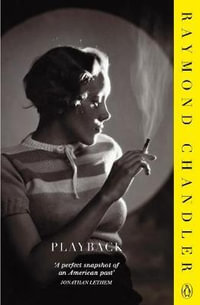
At a Glance
164 Pages
2.1 x 11.2 x 18
Paperback
$14.99
or 4 interest-free payments of $3.75 with
Aims to ship in 5 to 10 business days
When will this arrive by?
Enter delivery postcode to estimate
About The Author
'One of the greatest crime writers, who set standards that others still try to attain.' Sunday Times
Raymond Chandler was born in Chicago in 1888 and moved to England with his family when he was twelve. He attended Dulwich College, Alma Mater to some of the twentieth century’s most renowned writers. Returning to America in 1912, he settled in California, worked in a number of jobs, and later married.
It was during the Depression era that he seriously turned his hand to writing and his first published story appeared in the pulp magazine Black Mask in 1933, followed six years later by his first novel. The Big Sleep introduced the world to Philip Marlowe, the often imitated but never-bettered hard-boiled private investigator.
A Kind of Lightning...
I'd read Sherlock Holmes and John Buchan at school. I'd discovered the thrill of popular fiction through Jaws and The Godfather. Then, one rained-off English summer, I stayed indoors with a three-volume collection of Raymond Chandler, and everything changed...
Chandler gave me the taste for dark and realistic crime fiction, where the solving of a puzzle is less important than character, and his influence on the mystery writers of today – especially those of us whose detectives drift through the uglier urban landscapes – remains as obvious as a bloodstain on a blonde. Though others – notably Dashiell Hammett – had written what came to be called 'hard-boiled' crime fiction earlier, it was Chandler who, over the course of seven novels and a score of short stories, gave it a style; who defined it. He did this best through the iconic character of Philip Marlowe, a twenty-five dollars a day detective, whose wry tone, readiness with a right hook or a smart remark, and reckless pursuit of the truth, have come to embody the hardboiled protagonist. For me though, it is the Marlowebeneath that remains so compelling: the lonely, 'shop-soiled Galahad' who plays chess and reads poetry; who keeps the biggest bruises hidden; who, in a world where no one is quite what they seem, is perhaps the greatest faker of all. For every wisecrack and sap to the skull, it is the sensitivity behind the Black Mask that gives Chandler's books the depth and the power that they retain more than half a century on.
And it's all there in spades in The High Window: a serpentine plot that sees Marlowe begin on the trail of a single stolen coin and end up 'knee-deep in bodies'; gun-play and fisticuffs enough for those who want action; an unmatched sense of place, with pre-war Los Angeles captured brilliantly in a bleached-out snapshot, and of course, more drop-dead one-liners than most writers could produce in a lifetime – just check out the description of Lois Morny lying by the pool! Through the eyes of its complex and uncertain hero, The High Windowdrags the reader at speed through a city drowning in corruption, where honesty won't get you anywhere and law and order are, as Chandler said, 'things we talk about'.
The High Window was filmed twice: as Time To Kill (1943) and The Brasher Doubloon(1947) but neither adaptation was successful. For those who only know Chandler and Marlowe from the movies – even the great ones like The Big Sleep and Robert Altman's eccentric seventies take on The Long Good-bye – reading the novel will be a revelation. Though written just before Chandler's career in Hollywood took off, The High Window has a pace and a punch that are clearly the work of a man who would go on to write some wonderful screenplays. There is a power, and a fast-cut vitality to the writing which prompted this description from an awestruck Billy Wilder:
'By God, a kind of lightning struck on every page.'
For those new to the atmospheric electricity of Raymond Chandler, I envy you the treat in store. I can assure anyone coming back for more, that lightning can very definitely strike twice...
One
The house was on Dresden Avenue in the Oak Knoll section of Pasadena, a big solid cool-looking house with burgundy brick walls, a terra-cotta tile roof, and a white stone trim. The front windows were leaded downstairs. Upstairs windows were of the cottage type and had a lot of rococo imitation stonework trimming around them.
From the front wall and its attendant flowering bushes a half-acre or so of fine green lawn drifted in a gentle slope down to the street, passing on the way an enormous deodar around which it flowed like a cool green tide around a rock. The sidewalk and the parkway were both very wide and in the parkway were three white acacias that were worth seeing. There was a heavy scent of summer on the morning and everything that grew was perfectly still in the breathless air they get over there on what they call a nice cool day.
All I knew about the people was that they were a Mrs Elizabeth Bright Murdock and family and that she wanted to hire a nice clean private detective who wouldn't drop cigar ashes on the floor and never carried more than one gun. And I knew she was the widow of an old coot with whiskers named Jasper Murdock who had made a lot of money helping out the community, and got his photograph in the Pasadena paper every year on his anniversary, with the years of his birth and death underneath, and the legend: His Life Was His Service.
I left my car on the street and walked over a few dozen stumble stones set into the green lawn, and rang the bell in the brick portico under a peaked roof. A low red brick wall ran along the front of the house the short distance from the door to the edge of the driveway. At the end of the walk, on a concrete block, there was a little painted Negro in white riding-breeches and a green jacket and a red cap. He was holding a whip, and there was an iron hitching ring in the block at his feet. He looked a little sad, as if he had been waiting there a long time and was getting discouraged. I went over and patted his head while I was waiting for somebody to come to the door.
After a while a middle-aged sourpuss in a maid's costume opened the front door about eight inches and gave me the beady eye.
'Philip Marlowe,' I said. 'Calling on Mrs Murdock. By appointment.'
The middle-aged sourpuss ground her teeth, snapped her eyes shut, snapped them open and said in one of those angular hardrock pioneer-type voices: 'Which one?'
'Huh?'
'Which Mrs Murdock?' she almost screamed at me.
'Mrs Elizabeth Bright Murdock,' I said. 'I didn't know there was more than one.'
'Well, there is,' she snapped. 'Got a card?'
She still had the door a scant eight inches open. She poked the end of her nose and a thin muscular hand into the opening. I got my wallet out and got one of the cards with just my name on it and put it in the hand. The hand and nose went in and the door slammed in my face.
I thought that maybe I ought to have gone to the back door. I went over and patted the little Negro on the head again.
'Brother,' I said, 'you and me both.'
Time passed, quite a lot of time. I stuck a cigarette in my mouth, but didn't light it. The Good Humour man went by in his little blue and white wagon, playing 'Turkey in the Straw' on his music box. A large black and gold butterfly fish-tailed in and landed on a hydrangea bush almost at my elbow, moved its wings slowly up and down a few times, then took off heavily and staggered away through the motionless hot scented air.
The front door came open again. The sourpuss said: 'This way.'
I went in. The room beyond was large and square and sunken and cool and had the restful atmosphere of a funeral chapel and something the same smell. Tapestry on the blank roughened stucco walls, iron grilles imitating balconies outside high side windows, heavy carved chairs with plush seats and tapestry backs and tarnished gilt tassels hanging down their sides. At the back a stained-glass window about the size of a tennis-court. Curtained french doors underneath it. An old musty, fusty, narrow-minded, clean and bitter room. It didn't look as if anybody ever sat in it or would ever want to. Marble-topped tables with crooked legs, gilt clocks, pieces of small statuary in two colours of marble. A lot of junk that would take a week to dust. A lot of money, and all wasted. Thirty years before, in the wealthy closemouthed provincial town Pasadena then was, it must have seemed like quite a room.
We left it and went along a hallway and after a while the sourpuss opened a door and motioned me in.
'Mr Marlowe,' she said through the door in a nasty voice, and went away grinding her teeth.
ISBN: 9780143566489
ISBN-10: 0143566482
Series: Popular Penguins
Published: 29th August 2011
Format: Paperback
Language: English
Number of Pages: 164
Audience: General Adult
Publisher: Penguin UK
Country of Publication: GB
Edition Number: 1
Dimensions (cm): 2.1 x 11.2 x 18
Weight (kg): 0.16
Shipping
| Standard Shipping | Express Shipping | |
|---|---|---|
| Metro postcodes: | $9.99 | $14.95 |
| Regional postcodes: | $9.99 | $14.95 |
| Rural postcodes: | $9.99 | $14.95 |
How to return your order
At Booktopia, we offer hassle-free returns in accordance with our returns policy. If you wish to return an item, please get in touch with Booktopia Customer Care.
Additional postage charges may be applicable.
Defective items
If there is a problem with any of the items received for your order then the Booktopia Customer Care team is ready to assist you.
For more info please visit our Help Centre.























